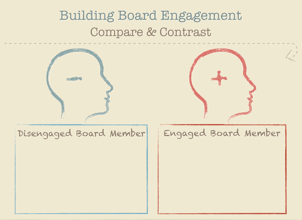Last Thursday I led our “Building Board Engagement” workshop for administrators and board leaders from schools that are members of the Association of Delaware Valley Independent Schools (ADVIS). Barbara Kraus-Blackney, Jennifer Braxton, and the rest of the ADVIS team provided a wonderful professional development venue at The Haverford School.
Believe it or not, in my session on Board Engagement we covered these key points in a little over an hour:
- 9 Board Responsibilities
- Characteristics of Effective School Boards
- The Complexities of School Design & Leadership
- 3 Elements of High Performing Boards
- Talent & Team Engagement: 20-60-20 Assessment
- 4 Stages of Board Development
- Setting More Effective Board Goals
Each of these areas can be greatly expanded on with valuable details, but we were able to review the main objectives in order to demonstrate the challenges and opportunities of board leadership. An engaged board isn’t one that operates beyond the boundaries of effective governance—rather it is a board that contributes the talents, expertise, energy, wisdom, and resources in a highly productive manner.
Engaged vs. Disengaged
One collaborative board exercise we recommended is comparing and contrasting descriptors/adjectives of an engaged board member verses one who is disengaged. The participants in our session included administrators and board members, and they produced this list of characteristics for an engaged board member:
+ Appropriately Present and Participating at board meetings and important school events
+ Connected with the other board members and the chief administrator
+ Generous, making the school a priority through financial gifts and time investments
+ Prepared for board meetings and for various situations that might arise
+ Collaborative in his/her approach to leadership and relationships
+ Positive, expecting the best of others and the school
This wasn't an exhaustive list by any means, but it provides a good starting point for your board to consider and expand upon. Comparing and contrasting engaged board member characteristics with those common to one who is disengaged can prompt a healthy dialogue regarding board performance and expectations.
Talent Quotient
The Talent & Team Engagement section of the Building Board Engagement workshop prompted a high level of interest and dialogue because our method provides a simple, yet direct process for assessing performance, providing feedback, and making needed adjustments. This is an area of weakness for far too many boards, often producing unhealthy tension in the leadership culture because of conflicting expectations.
What can you learn from your most productive board members? What are some of the common characteristics, backgrounds, experiences, etc.? How can you avoid adding new board members that tend to be less engaged and less effective? What is your Talent Quotient and how can it be improved to the benefit of the entire school?
If your board is trying to figure out how to improve board engagement and performance for the chief administrator, we can show you how to create a scorecard/rubric that is straightforward and provides great clarity.


